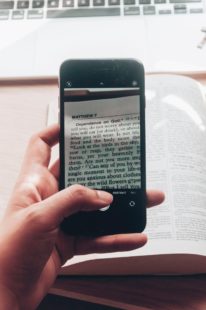Helpful Bible Verses about Not Worrying
Christian Counselor Spokane
 Worry is understood as our body’s natural response to anticipated future problems, while excitement is something that stirs up feelings of enthusiasm and interest. Both are future-oriented, get our hearts racing, and give us sweaty palms.
Worry is understood as our body’s natural response to anticipated future problems, while excitement is something that stirs up feelings of enthusiasm and interest. Both are future-oriented, get our hearts racing, and give us sweaty palms.
A video of Simon Sinek discussing how Olympic athletes experience worry as excitement is quite captivating. Sinek suggests we teach ourselves to flip the script and identify worry as excitement so that we benefit from being more present in the moment and so make better decisions for our anticipated future opportunities.
Bible Verses About Not Worrying
The Scriptures are full of Bible verses about not worrying, and the people in the center of these verses are dramatically different. They are both men and women, of varying ages and moral standing within their communities. They often share no other characteristics than simply knowing God.
Some of these individuals worried that they did not have enough faith, that they were inadequate in and of themselves to obey the task that God has set before them, or that they would be overtaken by circumstances. They sometimes objected to being obedient, confident in their incorrect assumptions or saying they did not have the right words.
There were many circumstantial obstacles preventing them from being confident to obey God, and it is clear that they worried. But in many cases, we can see how God helped them choose not to worry but trust him instead.
Examples from the Bible
To find Bible verses about not worrying, let’s look at notable Christians identified in Hebrews 11, where faith – the antidote to worry – is described as “…confidence in what we hope for and assurance about what we do not see” (Heb. 11:1 NIV). These people decided to place their faith in God though they all lived before Jesus, the Messiah, came to earth.
Noah
 Noah lived in a dry region and had to bear the mocking scorn of his community for building something no one had ever thought of before – an ark. There had been no rain, so they didn’t see the need for this huge construction project. But because he obeyed, he and his family, along with all the animals that came aboard, lived through a worldwide flood. Noah chose not to worry but trusted God’s words enough to obey them.
Noah lived in a dry region and had to bear the mocking scorn of his community for building something no one had ever thought of before – an ark. There had been no rain, so they didn’t see the need for this huge construction project. But because he obeyed, he and his family, along with all the animals that came aboard, lived through a worldwide flood. Noah chose not to worry but trusted God’s words enough to obey them.
Abraham
Abraham got up and left his country, his people, and his father’s household to go to a place the Lord promised to show him even though he did not know where he was going (Gen. 12:1). He did not know what the Lord had planned for him but acted in obedience to God’s instruction.
Later God said to him, “Do not be afraid, Abram. I am your shield, your very great reward” (Gen. 15:1 NIV) With this great assurance from the Lord, you might expect the next part to be about not worrying. Rather, Abraham goes on to point out to God that his reward will be temporary, as no matter his wealth or fame he would not be remembered as he had no heir. Here Abraham expressed his worry to the Lord.
Abraham’s tests of faith did not stop with the eventual birth of his heir, Isaac. The stand-out test was God’s instruction in Genesis 22:2 NIV: “Take your son, your only son, whom you love—Isaac—and go to the region of Moriah. Sacrifice him there as a burnt offering on a mountain I will show you.” Abraham was obedient, and as he raised the knife to complete the task – but God stopped him.
As Hebrews 11:17-19 NIV explains, “By faith Abraham, when God tested him, offered Isaac as a sacrifice. He who had embraced the promises was about to sacrifice his one and only son, even though God had said to him, ‘It is through Isaac that your offspring will be reckoned.’ Abraham reasoned that God could even raise the dead, and so in a manner of speaking he did receive Isaac back from death.” Abraham’s faith was so strong by that point he knew God could do anything, and his worries had faded.
Sarah
 Sarah laughed when a visitor to her home and prophesied a good thing – the birth of a long-awaited child (Gen. 18:1-15). But it was not a laugh of relief and joy but rather scorn as, while she laughed she thought: “After I am worn out and my lord is old, will I now have this pleasure?” (Gen 18:12 NIV). She was worried that the prophecy would not come true, yet God proved himself faithful.
Sarah laughed when a visitor to her home and prophesied a good thing – the birth of a long-awaited child (Gen. 18:1-15). But it was not a laugh of relief and joy but rather scorn as, while she laughed she thought: “After I am worn out and my lord is old, will I now have this pleasure?” (Gen 18:12 NIV). She was worried that the prophecy would not come true, yet God proved himself faithful.
Rahab
Rahab, who ran a brothel in a pagan city about to be invaded by the Israelite army, was concerned that she and her family would be killed by the invading Israelites. In Joshua 2:9-11 NIV she said to two Israelite spies whom she had hidden from the authorities, “I know that the Lord has given you this land and that a great fear of you has fallen on us so that all who live in this country are melting in fear because of you. We have heard how the Lord dried up the water of the Red Sea for you when you came out of Egypt, and what you did to Sihon and Og, the two kings of the Amorites east of the Jordan, whom you completely destroyed. When we heard of it, our hearts melted in fear and everyone’s courage failed because of you, for the Lord your God is God in heaven above and on the earth below.”
Then she bargained with them in Joshua 2:12-13 NIV, “Now then, please swear to me by the Lord that you will show kindness to my family because I have shown kindness to you. Give me a sure sign that you will spare the lives of my father and mother, my brothers and sisters, and all who belong to them—and that you will save us from death.” Rahab did not know any Bible verses about not worrying, but she knew who the Lord was: “God in heaven above and on the earth below.”
Jonathan
In 1 Samuel 14:6a ESV, Jonathan, son of Saul, said to his young armor-bearer, “Come, let us go over to the garrison of these uncircumcised.” Consider how Jonathan dealt with his emotion in the second half of this verse: “It may be that the Lord will work for us, for nothing can hinder the Lord from saving by many or by few” (1 Sam. 14:6b). He trusted God with the outcome, so his worries decreased.
David
 In 1 Samuel 17 during the story of David and Goliath, David anticipated his future problems. He first reflected on what God had done for him in the past: “The Lord who delivered me from the paw of the lion and from the paw of the bear will deliver me from the hand of this Philistine” (1 Sam. 17:37 ESV).
In 1 Samuel 17 during the story of David and Goliath, David anticipated his future problems. He first reflected on what God had done for him in the past: “The Lord who delivered me from the paw of the lion and from the paw of the bear will deliver me from the hand of this Philistine” (1 Sam. 17:37 ESV).
After choosing five smooth stones he shouted up to the giant warrior, “This day the Lord will deliver you into my hand, and I will strike you down and cut off your head” (1 Sam. 17:46 ESV). God did just as he said.
What We Learn About Not Worrying
Here we have considered major figures in Christian history – Noah, Abraham, Sarah, Rahab, Jonathan and David– and seen that instead of not worrying, they did worry. To say they were never anxious is not true. Their lives, like ours, were unpredictable. Yet, in whom did they place their trust? On the one true God, and we can do the same.
Despite the ways they expressed doubt, the quantity or quality of their faith did not determine how God would act. Rather, God showed them how much he loved them through his faithfulness and care for them.
Bible verses about not worrying are seen in the manner that these people grew in their faith. For example, God blessed Noah and his family for obeying him. Sarah received a son from the Lord. Rahab was grafted into Jesus’ genealogy.
If you need more help with not worrying, a Christian counselor can teach you how to apply biblical principles to the unique challenges you face. By meeting with a counselor, you can stop the cycle of worrying and grow in your faith.
According to Tiffe (2020), there are several more reasons not to worry. These include: Worrying affecting one’s body physically, overshadowing God’s message / making us spiritually unfruitful, producing a complaining soul, reflecting a divided mind, potentially losing sight of God’s Fatherly care, potentially reflecting a lack of faith.
Christian counseling can help bolster one’s resolve and resiliency. Worrying, while everyone does that from time to time, is most often not a necessary burden.
Reference
Tiffe, A. (2020). Biblical Reasons Not to Worry. Available online: https://biblicalcounseling.com/resource-library/articles/biblical-reasons-not-to-worry/
“Touching the Water”, Courtesy of Yoann Boyer, Unsplash.com, CC0 License; “Relax”, Courtesy of Clem Onojeghuo, Unsplash.com, CC0 License; “Worry Less”, Courtesy of Kelly Sikkema, Unsplash.com, CC0 License; “Matthew 7”, Courtesy of Maria Oswalt, Unsplash.com, CC0 License





